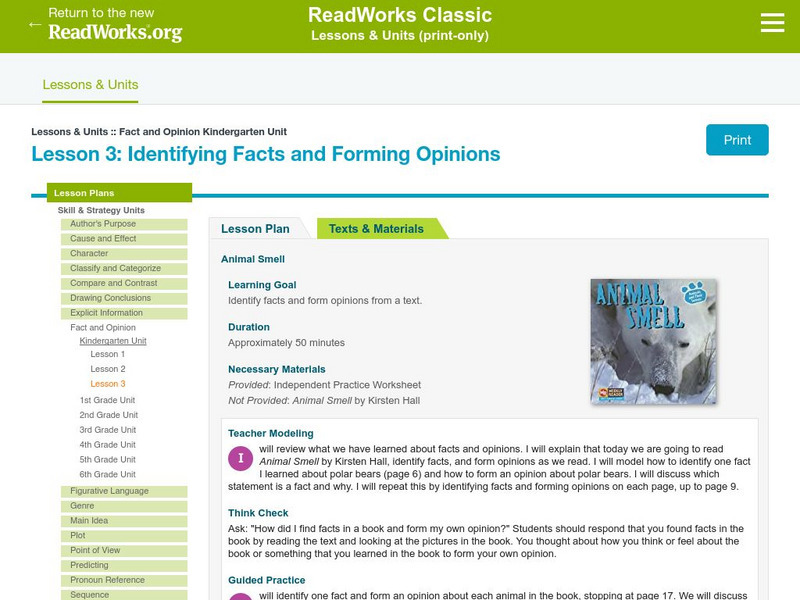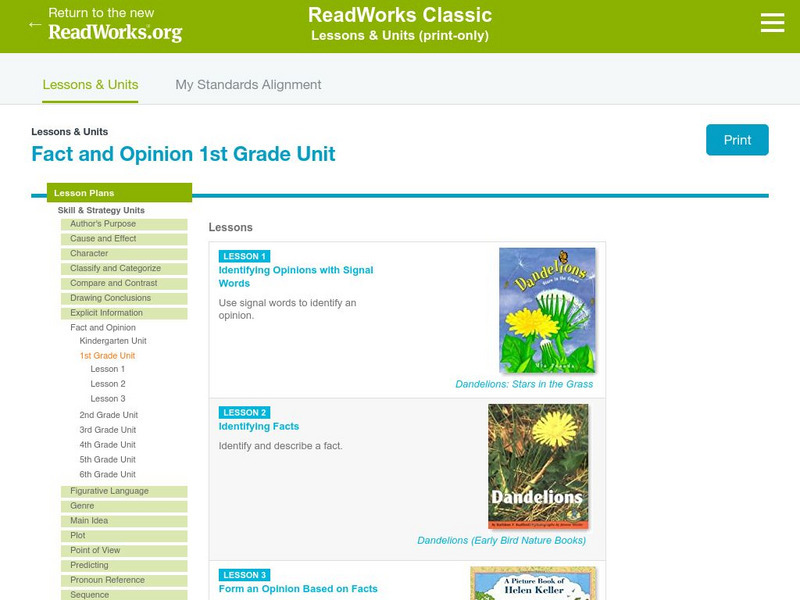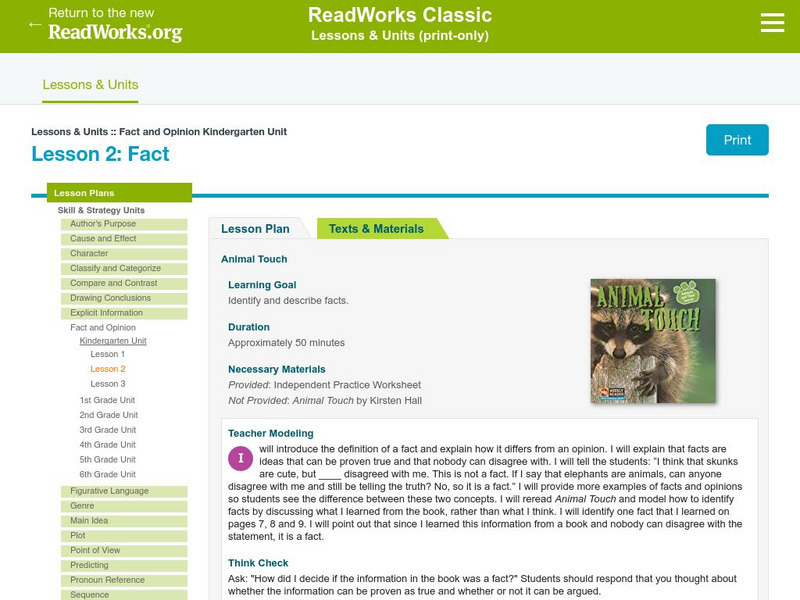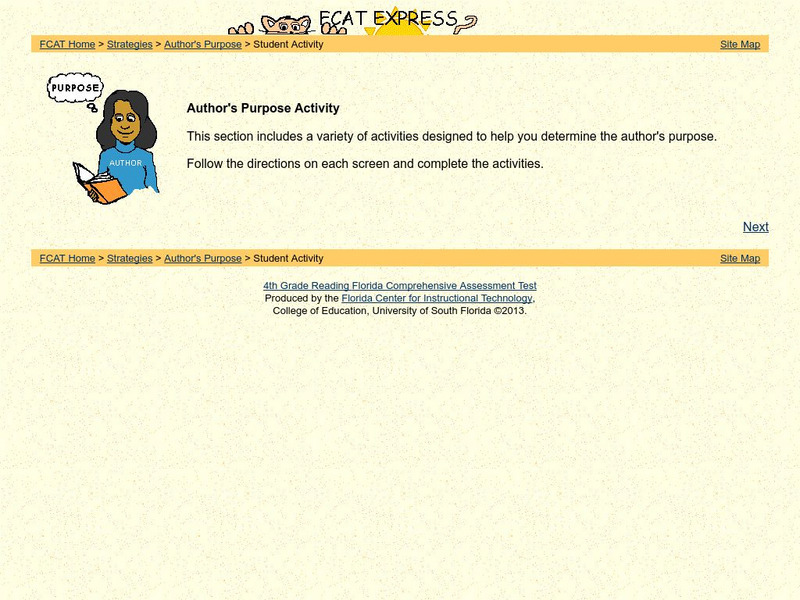EngageNY
TASC Transition Curriculum: Workshop 12
How can opinions slant facts? Workshop participants learn how to examine primary and secondary sources and identify the author's point of view. They also examine how visual art impacts the meaning and rhetoric of sources. Full of...
New York State Education Department
TASC Transition Curriculum: Workshop 11
You'll C-E-R a difference in classroom achievement after using a helpful lesson plan. Designed for economics, civics, government, and US history classes, participants practice using the CER model to craft arguments about primary and...
Read Works
Read Works: Lessons: Lesson 3: Identifying Facts and Forming Opinions
[Free Registration/Login Required] A lesson plan and materials to teach kindergarten students identify facts and form opinions using the book Animal Smell.
Read Works
Read Works: Grade 2: Two Lesson Unit: Fact and Opinion
[Free Registration/Login Required] Designed to teach students to identify fact and opinion in a text. Lessons are based on the text "Dear Diary" and the book Penguins by Lynn M. Stone. Includes ideas for direct teaching, guided practice,...
Read Works
Read Works: Fourth Grade: Two Lesson Unit: Fact and Opinion
[Free Registration/Login Required] A two-lesson unit on fact and opinion through which students identify facts and opinions in a newspaper article and understand how facts support opinions in an editorial. With free login, users have...
Better Lesson
Better Lesson: Identifying and Writing Opinions About Clouds Using Clue Words
It is important to teach students the difference between facts and opinions. This is the groundwork for getting students to think critically when analyzing a piece of text. This instructional activity will help to lay the foundation for...
Read Works
Read Works: Fact/opinion Kindertarten Unit: Identifying Facts, Forming Opinions
[Free Registration/Login Required] A instructional activity using Animal Smell by Kirsten Hall to teach students to find factual information inside informational texts and begiE3229:E3236n to form opinions based on information within the...
Read Works
Read Works: Fact and Opinion 3rd Grade Unit
[Free Registration/Login Required] A three-lesson unit on fact and opinion through which students learn how to identify facts and opinions in different fiction genres. Students also use non-fiction texts to identify and verify facts and...
Read Works
Read Works: Fact and Opinion 1st Grade Unit
[Free Registration/Login Required] A three-lesson unit on fact and opinion through which students learn how to identify opinions through signal words, identify facts in a non-fiction text, and use facts to help them formulate opinions of...
E Reading Worksheets
E Reading Worksheets: Fact and Opinion: Reading Test 3
A 25-question quiz where students must identify statements as fact or opinion. Results can be printed, saved, or emailed.
ClassFlow
Class Flow: Fact or Opinion
[Free Registration/Login Required] This flipchart reviews the definitions of fact and opinion and gives the students opportunities to sort and identify fact and opinion statements.
Read Works
Read Works: Washington Rides Again
[Free Registration/Login Required] An informational text about wax statues of George Washington at Mount Vernon in Virginia. A question sheet is available to help students build skills in identifying fact and opinion.
Read Works
Read Works: Lessons: Lesson 2: Fact
[Free Registration/Login Required] A lesson plan and materials to teach kindergarten students identify and describe facts using the book Animal Touch.
Texas Education Agency
Texas Gateway: Analyze Literary Essays' Inclusion of Personal Opinions and Facts
In this lesson, you will learn how to identify and discuss the use of facts, personal examples, and ideas and how they are woven into a literary essay.
University of South Florida
University of South Florida: Fcat Express: Author's Purpose Activity
Practice identifying author's purpose by recognizing the purpose in titles, understanding the difference between fact and opinion, and identifying the purpose of various forms of writing.
CommonLit
Common Lit: "The Limits of Empathy" by David Brooks
In this opinion piece, David Brooks discusses his views on empathy and whether or not it influences our actions. As you read, identify the claims David Brooks makes about empathy. [Free account registration required for specific tools.]
Better Lesson
Better Lesson: Finding the Author's Purpose
What is autism? How does it affect behavior? Students will find evidence of the author's tone or purpose for writing the article, as well as hints that show evidence of opinion. Includes a video clip from the movie "Rainman", and an...













